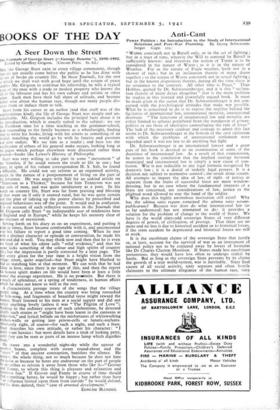BOOKS OF THE DAY
A Seer Down the Street
Mess like George Stun exist in every village community, though they do not usually come before the public as he has done with his set of books on country life. In these journals, for the rest of which we shall wait with good hope until the return of peace enables Mr. Grigson to continue his editorship, he tells a typical story of the man with a trade or modest property who knows the life of the labourer and has his own culture and artistic or other talent. Such men have their full share of solitude, and become rather wise about the human race, though not many people dis- cover them or induce them to talk.
Apart from his career as an author (and that itself was of the unpretentious kind), the life of George Sturt was simple and un- remarkable. Mr. Grigson includes the principal facts about it in his introduction, which is exactly suited to the subject : we see the Farnham man for a time teaching in the grammar-school, then succeeding to the family business as a wheelwright, finding time to write his books', living with his sisters as something of an invalid, watching the world go by with its fancies and passions and new orders. We see him as a reader ; and here too the recollection of others of his general make occurs, looking long at the pages which perhaps elsewhere were discussed rather than perused—books like Lewes's History of Philosophy.
Sturt was very willing to take part in some " movement " of the 'nineties, if he could reason the truth to life in one ; but ere, in spite of his valiant correspondent H. S. Salt, he found hdifficulty. He could not see reform as an organised activity, xcept in the nature of a postponement of living on the part of i
e reformer. He was angry with Salt for an unkind article on Tennyson as a Thinker," because for him Tennyson was not at sort of man, and was quite satisfactory as a poet. In his atch on country life, Stun was far from praising and blessing I that went on if only it seemed rural, but he was quite certain at the plan of tidying up the poorer classes by prescribed and posed behaviours was off the point. It would end in confusion. is on account of such reflective occasions in the journals that ir. Grigson calls Stun " an indisputable seer of tendencies here England and in Europe," while he keeps his memory clear of y tincture of mysticism.
Setting forth on his diary as on an experiment, and putting it side at times, Stun became comfortable with it, and unconcerned ver his failure to report a good time coming. When he met ith a distinct character or episode or conversation, he made his ote and did it well. You may think now and then that he is even no fond of what his editor calls " solid evidence," and that his ene lacks something of the colour and high spirits of country e ; but the impression is partly corrected by a later page. The .st entry given for the year 1900 is a bright vision from the silage street, quite angelical—but Sturt might have blushed to
d us watching him at that moment. We can wish that he had allen in love, since there is no sign of this, and then the report s honest spirit makes on life would have been at least a little carer the average experience. He is no pessimist. But there is touch of splendour, or a spring of tenderness, in human affairs 'Inch he does not know so well as the rest.
A characteristic passage treats of the songs that the village ple sing. At a time when the country was being ransacked or folk-song, and fragments of beautiful verse might reward the
tinter, Stun listened to his men at a social supper and did not lice anything lovely (unless it was " The Pilgrim of Love ").
ticking to the ordinary course of such celebrations, he detected telly such strains as " might have been learnt in the canteens at . dershot," and lyrical ballads on the misfortunes of whitewashing tchen-walls or getting into prison-cells or lunatic-asylums. bsolutely right, of course—for such a night, and such a feast.
tun describes his own attitude, or rather his character: " I on't want heroics: but most details have a trick of looking petty, tit they cah be seen as parts of an intense lump which dignifies em."
He stares into a wonderful night-sky while the uproar of other beano, complete with steam round-about and the syren " of that ancient contraption, banishes the silence. He ccepts the whole thing, not so much because he does not hate e noise as because he hates any endeavour on the part of people e describes to reform it away from those who like it—" Grover Fanny, to whom this thing is pleasure and relaxation and armless fun." If Grover and Fanny in course of time should d something better, he would be happy ; but rather than have an influence foisted upon them from outside" he would defend, d he does defend, their " case of arrested development." EDMUND EUUNDEN.


























 Previous page
Previous page